Strictly Personal
Toast to Atiku, Besigye, Raila: Africa’s long-suffering presidential candidates, By Charles Onyango-Obbo
Published
1 year agoon
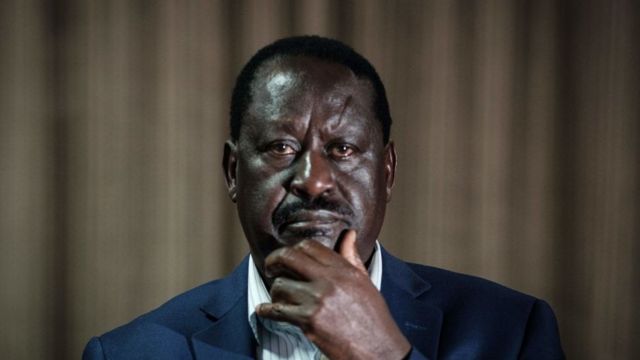
On March 1, Nigeria’s ruling party candidate Bola Tinubu was declared the winner of the contentious February 25 presidential election.
Tinubu, 70, torchbearer for the All Progressives Congress (APC) party, won 8.8 million votes against 6.9 million for opposition Peoples Democratic Party (PDP) candidate Atiku Abubakar and 6.1 million for fresh-faced insurgent Labour Party’s Peter Obi.
The wealthy power broker, businessman, former Lagos state governor, and crook to some will take over from President Muhammadu Buhari, who is stepping down after the two terms allowed by the constitution.
It was a typical African election, marred by the incompetence of the electoral commission, cheating (both real and imagined), violence, and everything in between. The losing parties rejected the result.
PDP’s Abubakar, a 76-year-old businessman, and former vice-president lost his sixth attempt at the presidency. It isn’t for everyone to keep going at it and lose that many times. Politicians like Abubakar deserve a salute.
Most-losing hopeful
In East Africa, the title of the most-losing presidential hopeful who didn’t give up belongs to 78-year-old former Kenyan prime minister Raila Odinga. Last August, he lost his fifth stab at the top job.
Following him closely is Ugandan medical doctor, former guerrilla, and leader of the Forum for Democratic Change, Dr. Kizza Besigye, who ran four times against Uganda’s eternal President Yoweri Museveni, who has been in office for 37 years now. He lost count on all four occasions.
Tanzanian opposition leaders don’t have the durability of their Kenyan and Ugandan counterparts, but they have offered a lot of ironies. Chadema’s Freeman Mbowe wasn’t always a free man, despite his name. In July 2021, he was arrested, along with 10 other members of the party, and accused of terrorism. Prosecutors dropped the terrorism case against him in March 2022.
The Kenya-Uganda stretch holds many records for the opposition. Three years ago, the news spread like wildfire on social media and the press that Besigye had been named the most arrested man in the world by the Guinness Book of Records when he was thrown behind bars for about the 50th time. It was fake news, but only for two reasons. First, the Guinness Book of Records had yet to do such a thing. Second, as was widely reported then, the honour belonged to Australian man Tommy Johns. By 1988, he had been arrested almost 3,000 times for being drunk and disorderly.
Besigye, however, would win the prize if the score was narrowed down to the most arrested presidential challenger.
Longest time in jail
Raila, on the other hand, tops the roll for having spent the longest time in jail, although it wasn’t as a presidential challenger. He was first arrested in late 1982 and charged with treason after being accused of being one of the masterminds of the failed coup earlier in August.
He was released six years later, in February 1988, but arrested and thrown in jail again in August of the same year, to be released in June 1989.
He was rearrested in July 1990, along with other pro-democracy and human rights activists at the height of the battle against the Kenyan one-party state. He was finally released on June 21, 1991.
It is remarkable to think that Raila’s political problems and Abubakar’s quest for the Nigerian presidency are older than Eritrea’s independence.
Besigye, 66, and therefore a child compared to Raila, was arrested and beaten for eyeing the State House nearly 10 years before South Sudan became independent in 2011.
Are these men heroes or martyrs?
A hero is defined as “a person who is admired for their courage, outstanding achievements, or noble qualities.”
A martyr is “a person who is killed because of their religious or other beliefs.”
Still around
They are all still around, so they are not martyrs in the classical sense of the word. Perhaps they are near heroes. They are courageous, and alright, but it would be extravagant to speak of their noble qualities. That leaves outstanding achievements as a good measure of their work.
The argument has been made that people like Abubakar, Raila, Besigye, Mbowe, and the rest of the failed presidential candidates club help entrench democracy by offering themselves — even if to lose because a competitive election is a precious political good in itself. That when elections take place, even if the outcome is fraudulent, it entrenches the idea that a people’s mandate is necessary for anyone to lead a country.
In the case of Raila, the challenges he made against the election outcomes, one of which was ground-breaking in being the first successful one in Africa, led to the perfection of both the election system and bought public faith in the 2010 Constitution.
Despite anger at election theft, it is not all in vain. Even the leaders who rig elections help make the important case that they are worthwhile enough to go to great lengths to steal. In the same way, there is great value in watching what many times is clearly a futile but incredibly brave and painful opposition quest to unseat an entrenched strongman through the ballot box.
It makes the point, to paraphrase Mahatma Gandhi, that democracy might not be worth killing for but is worth dying for.
Democratic advance, therefore, needs people like Besigye and Abubakar to run many times for the presidency and fail. By closing, it also means we never get to see them win power and fail as presidents like many promising opposition figures have done.
So, here is a toast to our long-suffering election losers.
Charles Onyango-Obbo is a journalist, writer, and curator of the “Wall of Great Africans”. Twitter@cobbo3
You may like
-


RepAir, Cella partner to launch carbon capture in Kenya
-


IMF predicts Kenya’s economy to overtake Angola
-
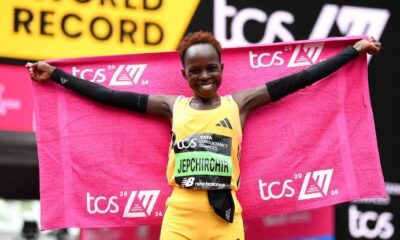

Kenya’s Peres Jepchirchir fulfils promise of breaking world record at London Marathon
-
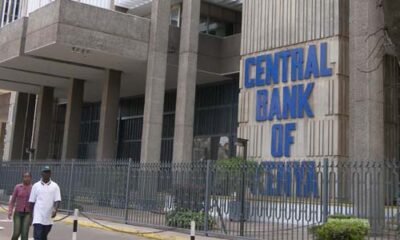

Investors’ wealth drops by $968 million on Nairobi Securities Exchange
-


This is chaos, not governance, and we must stop it, By Tee Ngugi
-


US faults Kenya’s financial management system portal
Strictly Personal
This Sudan war is too senseless; time we ended it, By Tee Ngugi
Published
15 hours agoon
April 28, 2024
Why are the Sudanese Armed Forces (SAF) and the paramilitary Rapid Support Forces (RPF) engaged in a vicious struggle? It is not that they have ideological, religious or cultural differences.
Not that people should fight because of these kinds of differences, but we live in a world where social constructions often lead to war and genocide. It is not that either side is fighting to protect democracy. Both sides were instruments of the rapacious dictatorship of Omar el-Bashir, who was overthrown in 2019.
Both are linked to the massacres in Darfur during Bashir’s rule that led to his indictment by the International Criminal Court for crimes against humanity. They both stood by as ordinary, unarmed people took to the streets and forced the removal of the Bashir regime.
None of these entities now fighting to the last Sudanese citizen has any moral authority or constitutional legitimacy to claim power. They both should have been disbanded or fundamentally reformed after the ouster of Bashir.
The SAF and the RSF are fighting to take over power and resources and continue the repression and plunder of the regime they had supported for so long. And, as you can see from news broadcasts, they are both well-versed in violence and plunder.
Since the fighting began in 2023, both sides have been accused of massacres that have left more than 30,000 people dead. Their fighting has displaced close to 10 million people. Their scramble for power has created Sudan’s worst hunger crisis in decades. Millions of refugees have fled into Chad, Ethiopia and South Sudan.
The three countries are dubious places of refuge. Chad is a poor country because of misrule. It also experiences jihadist violence. Ethiopia is still simmering with tensions after a deadly inter-ethnic war.
And South Sudan has never recovered from a deadly ethnic competition for power and resources. African refugees fleeing to countries from which refugees recently fled or continue to flee sums up Africa’s unending crisis of governance.
Africa will continue to suffer these kinds of power struggles, state failure and breakdown of constitutional order until we take strengthening and depersonalising our institutions as a life and death issue. These institutions anchor constitutional order and democratic process.
Strong independent institutions would ensure the continuity of the constitutional order after the president leaves office. As it is, presidents systematically weaken institutions by putting sycophants and incompetent morons in charge. Thus when he leaves office by way of death, ouster or retirement, there is institutional collapse leading to chaos, power struggles and violence. The African Union pretends crises such as the one in Sudan are unfortunate abnormally. However, they are systemic and predictable. Corrupt dictatorships end in chaos and violence.
Tee Ngugi is a Nairobi-based political commentator.
Strictly Personal
Air Peace, capitalism and national interest, By Dakuku Peterside
Published
2 weeks agoon
April 16, 2024
Nigerian corporate influence and that of the West continue to collide. The rationale is straightforward: whereas corporate activity in Europe and America is part of their larger local and foreign policy engagement, privately owned enterprises in Nigeria or commercial interests are not part of Nigeria’s foreign policy ecosystem, neither is there a strong culture of government support for privately owned enterprises’ expansion locally and internationally.
The relationship between Nigerian businesses and foreign policy is important to the national interest. When backing domestic Nigerian companies to compete on a worldwide scale, the government should see it as a lever to drive foreign policy, and national strategic interest, promote trade, enhance national security considerations, and minimize distortion in the domestic market as the foreign airlines were doing, boost GDP, create employment opportunities, and optimize corporate returns for the firms.
Admitted nations do not always interfere directly in their companies’ business and commercial dealings, and there are always exceptions. I can cite two areas of exception: military sales by companies because of their strategic implications and are, therefore, part of foreign and diplomatic policy and processes. The second is where the products or routes of a company have implications for foreign policy. Air Peace falls into the second category in the Lagos – London route.
Two events demonstrate an emerging trend that, if not checked, will disincentivize Nigerian firms from competing in the global marketplace. There are other notable examples, but I am using these two examples because they are very recent and ongoing, and they are typological representations of the need for Nigerian government backing and support for local companies that are playing in a very competitive international market dominated by big foreign companies whose governments are using all forms of foreign policies and diplomacy to support and sustain.
The first is Air Peace. It is the only Nigerian-owned aviation company playing globally and checkmating the dominance of foreign airlines. The most recent advance is the commencement of flights on the Lagos – London route. In Nigeria, foreign airlines are well-established and accustomed to a lack of rivalry, yet a free-market economy depends on the existence of competition. Nigeria has significantly larger airline profits per passenger than other comparable African nations. Insufficient competition has resulted in high ticket costs and poor service quality. It is precisely this jinx that Air Peace is attempting to break.
On March 30, 2024, Air Peace reciprocated the lopsided Bilateral Air Service Agreement, BASA, between Nigeria and the United Kingdom when the local airline began direct flight operations from Lagos to Gatwick Airport in London. This elicited several reactions from foreign airlines backed by their various sovereigns because of their strategic interest. A critical response is the commencement of a price war. Before the Air Peace entry, the price of international flight tickets on the Lagos-London route had soared to as much as N3.5 million for the economy ticket. However, after Air Peace introduced a return economy class ticket priced at N1.2 million, foreign carriers like British Airways, Virgin Atlantic, and Qatar Airways reduced their fares significantly to remain competitive.
In a price war, there is little the government can do. In an open-market competitive situation such as this, our government must not act in a manner that suggests it is antagonistic to foreign players and competitors. There must be an appearance of a level playing field. However, government owes Air Peace protection against foreign competitors backed by their home governments. This is in the overall interest of the Nigerian consumer of goods and services. Competition history in the airspace works where the Consumer Protection Authority in the host country is active. This is almost absent in Nigeria and it is a reason why foreign airlines have been arbitrary in pricing their tickets. Nigerian consumers are often at the mercy of these foreign firms who lack any vista of patriotism and are more inclined to protect the national interest of their governments and countries.
It would not be too much to expect Nigerian companies playing globally to benefit from the protection of the Nigerian government to limit influence peddling by foreign-owned companies. The success of Air Peace should enable a more competitive and sustainable market, allowing domestic players to grow their network and propel Nigeria to the forefront of international aviation.
The second is Proforce, a Nigerian-owned military hardware manufacturing firm active in Rwanda, Chad, Mali, Ghana, Niger, Burkina Faso, and South Sudan. Despite the growing capacity of Proforce in military hardware manufacturing, Nigeria entered two lopsided arrangements with two UAE firms to supply military equipment worth billions of dollars , respectively. Both deals are backed by the UAE government but executed by UAE firms.
These deals on a more extensive web are not unconnected with UAE’s national strategic interest. In pursuit of its strategic national interest, India is pushing Indian firms to supply military equipment to Nigeria. The Nigerian defence equipment market has seen weaker indigenous competitors driven out due to the combination of local manufacturers’ lack of competitive capacity and government patronage of Asian, European, and US firms in the defence equipment manufacturing sector. This is a misnomer and needs to be corrected.
Not only should our government be the primary customer of this firm if its products meet international standards, but it should also support and protect it from the harsh competitive realities of a challenging but strategic market directly linked to our national military procurement ecosystem. The ability to produce military hardware locally is significant to our defence strategy.
This firm and similar companies playing in this strategic defence area must be considered strategic and have a considerable place in Nigeria’s foreign policy calculations. Protecting Nigeria’s interests is the primary reason for our engagement in global diplomacy. The government must deliberately balance national interest with capacity and competence in military hardware purchases. It will not be too much to ask these foreign firms to partner with local companies so we can embed the technology transfer advantages.
Our government must create an environment that enables our local companies to compete globally and ply their trades in various countries. It should be part of the government’s overall economic, strategic growth agenda to identify areas or sectors in which Nigerian companies have a competitive advantage, especially in the sub-region and across Africa and support the companies in these sectors to advance and grow to dominate in the African region with a view to competing globally. Government support in the form of incentives such as competitive grants ,tax credit for consumers ,low-interest capital, patronage, G2G business, operational support, and diplomatic lobbying, amongst others, will alter the competitive landscape. Governments and key government agencies in the west retain the services of lobbying firms in pursuit of its strategic interest.
Nigerian firms’ competitiveness on a global scale can only be enhanced by the support of the Nigerian government. Foreign policy interests should be a key driver of Nigerian trade agreements. How does the Nigerian government support private companies to grow and compete globally? Is it intentionally mapping out growth areas and creating opportunities for Nigerian firms to maximize their potential? Is the government at the domestic level removing bottlenecks and impediments to private company growth, allowing a level playing field for these companies to compete with international companies?
Why is the government patronising foreign firms against local firms if their products are of similar value? Why are Nigerian consumers left to the hands of international companies in some sectors without the government actively supporting the growth of local firms to compete in those sectors? These questions merit honest answers. Nigerian national interest must be the driving factor for our foreign policies, which must cover the private sector, just as is the case with most developed countries. The new global capitalism is not a product of accident or chance; the government has choreographed and shaped it by using foreign policies to support and protect local firms competing globally. Nigeria must learn to do the same to build a strong economy with more jobs.
EDITOR’S PICK
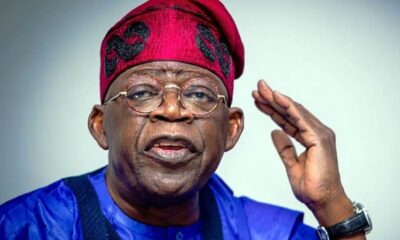

I saved Nigeria from bankruptcy by removing fuel subsidy— Tinubu
Nigerian President, Bola Tinubu, on Sunday, boasted that he saved Nigeria from going bankrupt by removing fuel subsidy on his...


Behind the News: All the backstories to our major news this week
Over the past week, there were lots of important stories from around the African continent, and we served you some...
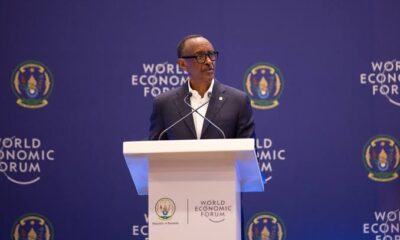

Video: How Rwanda is driving Ai revolution in Africa
In this video, the Managing Director of Rwanda’s Centre for the Fourth Industrial Revolution, Crystal Rugege, speaks on the country’s...


This Sudan war is too senseless; time we ended it, By Tee Ngugi
Why are the Sudanese Armed Forces (SAF) and the paramilitary Rapid Support Forces (RPF) engaged in a vicious struggle? It...
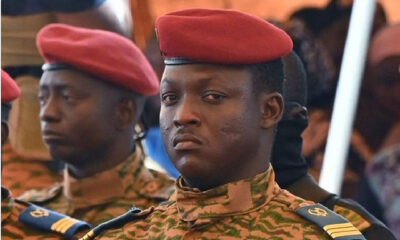

Burkina Faso investigating reports of northern killings
A government spokesman has revealed that Burkina Faso is looking into reports that 223 people were killed by the Burkinabe...
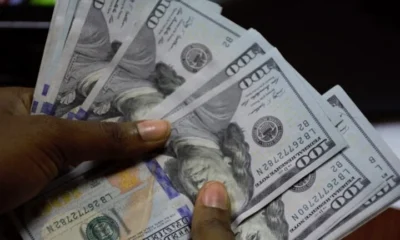

Nigeria: Bureaux De Change operators to harmonise retail FX market
Amidst the volatility around the Nigerian currency and its foreign exchange market, the Association of Bureaux De Change Operators in...


France willing to pay for Morocco’s 3GW power line to Western Sahara
Bruno Le Maire, the French finance minister, said on Friday that France was ready to help pay for a 3...
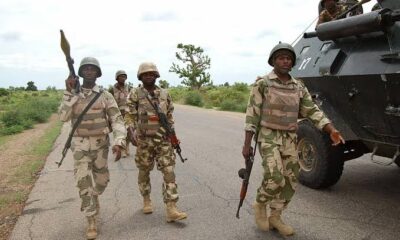

Nigerian troops neutralise 216 terrorists, arrest 332 in one week— Official
The Nigerian Army Defence Headquarters (DHQ) says troops from different operation theaters across the country neutralised 216 terrorists and arrested...
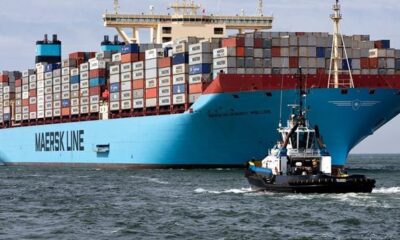

Nigeria loses $9.2 billion to foreign shipowners
A group of maritime experts has revealed that Nigeria loses $9.2bn a year to foreign shipping lines that carry goods...


Nigeria wants managers for proposed $10 billion diaspora fund
A tender paper shows that Nigeria is looking for fund managers for a $10 billion diaspora fund to bring in...
Trending
-

 Tech2 days ago
Tech2 days agoRepAir, Cella partner to launch carbon capture in Kenya
-

 Culture2 days ago
Culture2 days agoCollabo with Burna Boy enabled me buy house for my mum— Mozambican DJ Tarico
-

 Sports2 days ago
Sports2 days agoAl Ahly, Esperance to clash in CAF Champions League final
-

 Behind the News14 hours ago
Behind the News14 hours agoBehind the News: All the backstories to our major news this week


